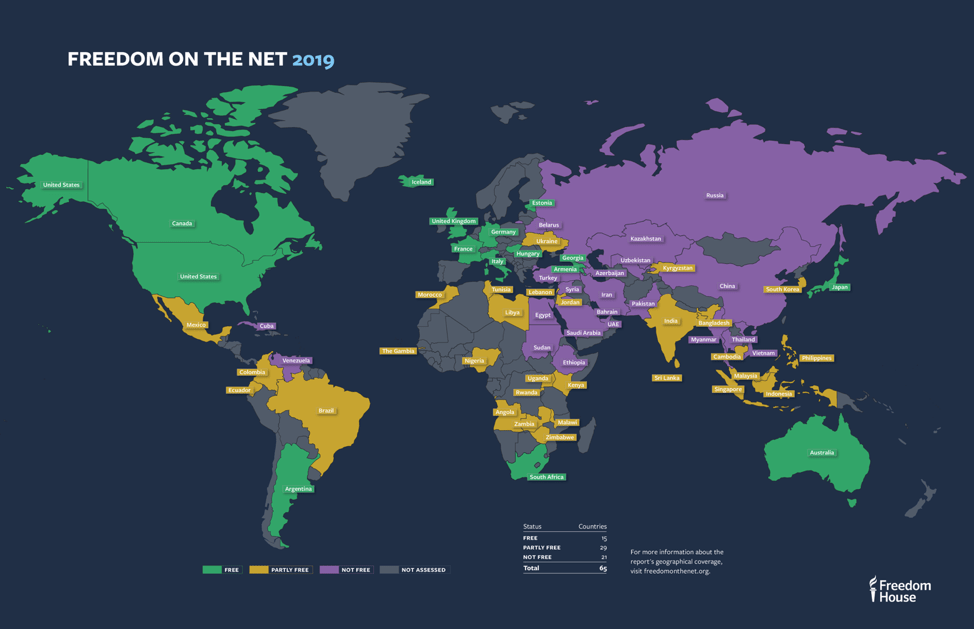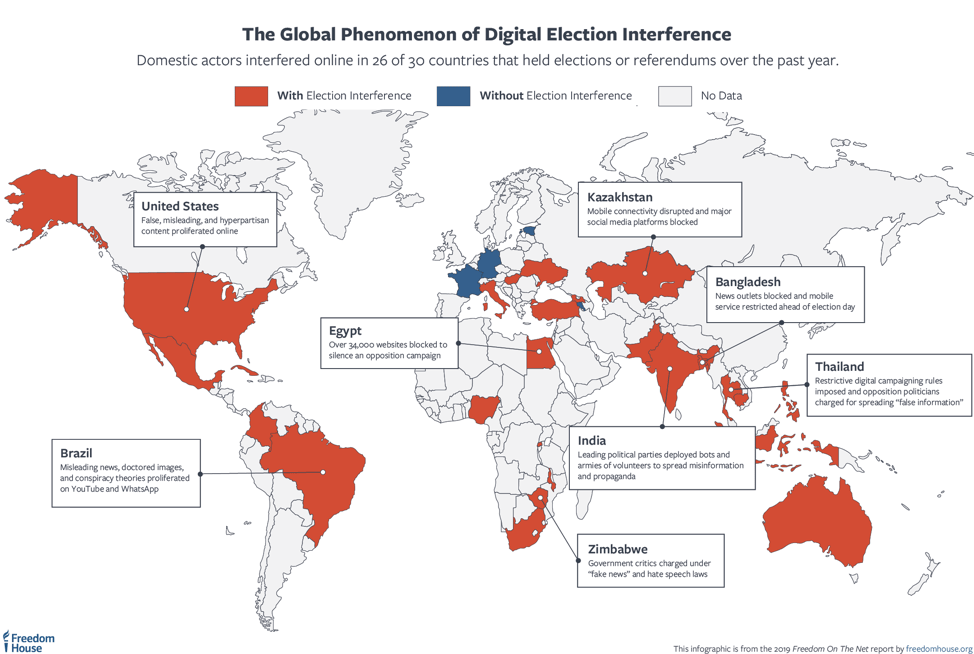Global Internet freedom declined for the ninth consecutive year in 2019, largely as a result of social media increasingly being used by governments around the world as a conduit for mass surveillance and electoral manipulation. The Freedom on the Net 2019 report, the latest edition of the annual country-by-country assessment of Internet freedom, was released on November 5 by Freedom House, and highlights the shift in social media from a level playing field for civic discussion to an instrument of political distortion and societal control.
The Freedom on the Net 2019 report analyzed Internet freedom in 65 countries worldwide, covering 87% of global Internet users. Surveyed countries are designated as ‘Free’, ‘Partly Free’, or ‘Not Free’ based on an examination of, and scoring against, three categories: obstacles to access, limits on content, and violations of user rights.

Of the 65 countries assessed, 33 of them saw Internet freedom decline over the last year, with the biggest drops observed in Sudan and Kazakhstan. The longtime presidents of both countries were ousted, leading to widespread blocking of social media platforms, disruptions of Internet connectivity, and the increased use of electronic surveillance to undermine free expression.
The report called digital platforms “the new battleground for democracy,” finding evidence of digital election interference in 26 of the 30 countries studied that held national votes over the last year. It notes that Internet freedom restrictions tend to escalate before and during crucial votes, and that digital election interference was found to have taken three forms: informational measures (surreptitious manipulation of online discussions), technical measures (including access restrictions), and legal measures (to punish opponents and limit political expression).

Freedom House’s analysis also found that Internet freedom in the United States declined for the third straight year. Although it highlighted that the online environment within the country continues to remain vibrant, diverse, and free from state censorship, the report also called out a number of factors that drove the Internet freedom score lower, ranking the U.S. seventh globally. These included:
- Expanded surveillance of the public by law enforcement and immigration agencies, with limited oversight or transparency.
- Increased monitoring of social media platforms.
- Disinformation around major political events, with both foreign and domestic actors manipulating content for political purposes.
As noted above, connectivity/access restrictions and Web site/application blocking have become increasingly popular tactics. This year’s report found that social media and communications applications were blocked in at least 20 surveyed countries. Internet connectivity didn’t fare much better, with telecommunications networks suspended in 17 surveyed countries. These actions often occurred ahead of elections or during periods of protest and civil unrest. Unfortunately, this remains an ongoing issue, as cited in our summary of the Freedom on the Net 2017 report.
Despite the declines in Internet freedom and their underlying causes highlighted in the report, the news was not all bad this year. Freedom House found that 16 surveyed countries earned improvements in their Internet freedom scores, with the greatest gain seen in Ethiopia. While network shutdowns unfortunately continued to occur in the country, they were more temporary and localized than previous nationwide shutdowns. In addition, the new Prime Minister’s government loosened restrictions on the Internet, unblocking over 250 Web sites, and also reduced the number of people imprisoned for online activity.
Malaysia and Armenia were also specifically called out for their positive progress, and Iceland was listed as the “world’s best protector of Internet freedom”, with the report stating “The country boasts enviable conditions, including near-universal connectivity, limited restrictions on content, and strong protections for users’ rights.”
How you can get involved:
- Read the full Freedom on the Net 2019 report to gain deeper insight into this year’s findings.
- Attend the Freedom on the Net 2019 launch event on November 12 for a discussion of key findings and emerging trends in Internet freedom, including the shifting methods used by governments to manipulate elections and monitor citizens on social media.
- Review the country-level rankings to understand the key Internet controls employed in your country, and other countries of interest.
- Use the recommendations within the report as guidance for outreach to local policymakers, initiatives within the private sector, and participation in civil society activities.
- Follow organizations including Freedom House (@freedomhouse) and the Internet Society (@internetsociety) on social media to stay up-to-date on issues concerning Internet freedom around the world.
The Internet Society is a proud supporter of Freedom House and the Freedom on the Net initiative because their work aligns closely with our goals for the Internet to be open, globally-connected, secure, and trustworthy.

